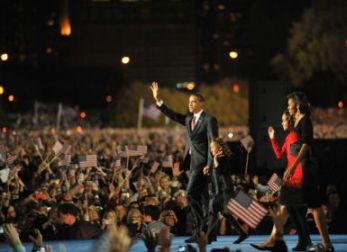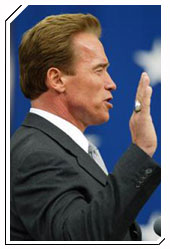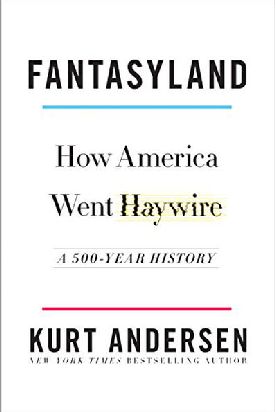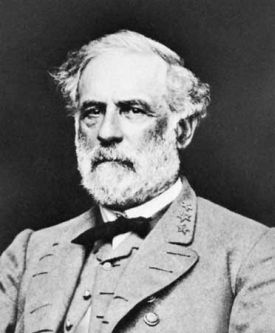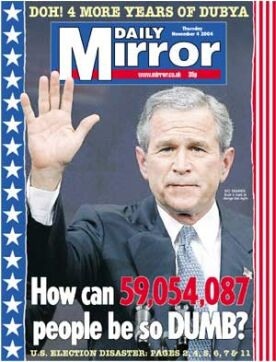The History of an Election
From The New Criterion“Well,” said the media, in effect, as they looked joyfully around them at the torn and crumpled wrappings on the morning of what, for them, was the early Christmas of November 5th, “now we’re all in agreement.” And if your experience of the world was limited to what the media provides, you’d think it was true, too. Scenes of weepy celebration were everywhere represented to audiences assumed to be celebrating too for days afterwards. Even some conservatives claimed to have wept for joy at the victory of the least conservative member of the United States senate in the presidential election. It was a great day not just for the Democrats but for all Americans, as everyone — even the defeated Republican — was saying. Of course, it would have been churlish to deny it.
Back in 2004, the media had consoled themselves for the disappointment of John Kerry’s loss to George W. Bush with the much-repeated opinion that at least the minority who had voted for Senator Kerry were smarter than the majority who had voted for President Bush. “How can 59,054,087 people be so DUMB?” as The Daily Mirror of London notoriously asked. Now the 57,434,084 who had voted for John McCain were presumably equally dumb, but they might just as well not exist, nor ever have cast their votes in dissent at the prospect of this gloriously Obamantic dawn. All the media could see was a unanimity of celebration of the “historic” victory for Barack Obama — which, by the way and not entirely coincidentally, also proved that they had been right all along about President Bush. At last the smart people would be in charge again!
Whatever happened to Paul Begala’s so sage-sounding opinion of only a few months ago that the Democrats couldn’t win with a coalition limited to “eggheads and African-Americans”? I know there are many other plausible answers to that question, including the ineptitude of the McCain campaign, the unpopularity of the incumbent party and the financial crisis of September which was so largely if unjustly blamed on that party. All these factors doubtless had something to do with the election of the most liberal president in America’s history. But my belief is, as I may have mentioned before, that the more interesting reason has to do with the large expansion of the class of the eggheads in the 20 years since they failed to be numerous enough to push Michael Dukakis over the top against George Bush the elder. What changed is that the egghead class opened its doors to the much larger class of those who merely wanted to be eggheads and so to assume the status perquisites of the cognitive élites in early 21st century America.
It was already clear in 2004 that the Democrats’ re-branding as the party rather of the intellectual élites than of the shrinking blue-collar class that had been their heart and soul since 1932 was beginning to bear fruit. John Kerry had nothing to offer the electorate but the egghead’s standard equipment of his own giant brain and his even more giant sense of moral superiority, and he almost won. It was then that a sharp-eyed observer might have realized that even the defection of the “Reagan Democrats” in the 1980s had failed to transform the party in the way that romantic baby-boomers like Howard Dean and John Kerry, nostalgic for the days of “teach-ins” and riotous university campuses awash in sex, drugs and rock’n’roll, were now succeeding in doing with the help of what the media eagerly represented as a re-run of Vietnam in Iraq. All their efforts only prepared the way for Barack Obama, who was able to distance himself from the cultural upheavals of the sixties — he was famously only eight years old when Bill Ayers was mounting his quixotic if violent assault on what was then the Establishment — while adopting as his own the boomers’ massive self-conceit and self-righteousness.
No surprise, then, that those who would claim a share in this moral superiority now make up a majority. But O! that I should find myself so poor, even among the contemptible losers, as to be part of one of the most invisible minorities extant at the dawning of the age of Obama — namely, the minority of those who could not see a victory for themselves in that of the President-elect. Everyone from disgruntled Republicans (whose party abandoned them, or didn’t listen to their sage counsel, and so lost) to Islamicist terrorists (“Jihadi Leader Says Radicals Share Obama Victory,” reported The New York Times) could find his own vindication in it. Yet outside the circle of the Obama campaign staff, there could be few better entitled to claim a share in his success than the media. They had shamelessly promoted his candidacy from the beginning, so it was natural that they should regard his winning as also a win for the media consensus — for its two thumbs way, way down on the Bush administration and the war in Iraq, for its devout if puzzling belief in the Obamagic that could not fail effortlessly to solve our most intractable economic and social as well as military problems and, above all, for the hype, rhetorical excess and utopian expectations of our political leadership that have characterized the national dialogue in the 21st century.
So the pundits had a right to the riotous celebrations they staged in print over the election. It really was their election too. Yet I couldn’t help being a little surprised when those celebrations revealed the extent to which the media believed their own hype about the new president. I guess I’m just an old cynic, but some part of me must have trusted that, deep down inside, they didn’t really think he was the Messiah, the Chosen One the Savior and the Healer and the Rescuer of the downtrodden Middle Class. They must have known that all this was just a lot of hot air, though they chose not to say so because they wanted him to win and saw the myth as useful with a credulous public. But no, they were as credulous as anybody. I realized this while perusing the post-mortem on Senator Obama’s “inevitable” victory by Anne Applebaum in the London Daily Telegraph and the cordless mouse nearly dropped from my nerveless fingers as I read the following words: “In fact — improbable though it may sound — I am now completely convinced that it was not, in the end, a disadvantage for Obama to be black.”
Improbable though it may sound? Did anybody really think it improbable that Senator Obama’s implied narrative — and so much the more effective for being implied rather than stated openly — of himself and his career as the representative of his people and of their struggle against white racism on the way to political empowerment might be utter piffle? I had thought it could only have been the fear of being branded as a racist which prevented anyone in the media from saying the obvious, namely that there was not the smallest possibility that the junior senator from Illinois could have woken up the previous morning as President-elect — he might well not even have been the junior senator — if he had been white. Yet now here was my friend Anne, a brilliant woman and a winner of the Pulitzer prize for an excellent book on the Soviet Gulag, not only daring to hint at such a thing but announcing it as an amazing discovery of her own — “as I predicted would be the case in January of last year” — that “his race proved enormously advantageous, one of the keys to his victory.”
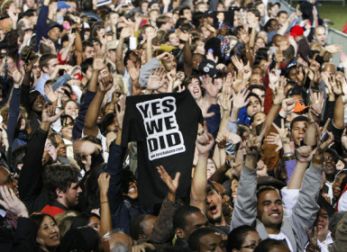 |
I know it sounds a wild theory, but hear her out. She is not even talking, she tells us, about the heavy turnout among black voters but of the fact that “his race was an enormous attraction for many white Americans too, even — or perhaps especially — some white Republicans. Here is something that may be hard for foreigners to understand: Americans desperately want to believe that their country stands for fairness, for equality, for democracy.” Do tell! And are there also, then, Americans for whom a vote for Senator Obama could have been a form of self-congratulation for their own liberal-mindedness? She might have cast her eyes upwards just above her column to a wry Nicholas Garland cartoon of a white man breaking off a thick pair of manacles labeled “white guilt” under the heading: “Free At Last!” I don’t know. Maybe it is hard for foreigners to understand, but what’s hard for me to understand is how something so obvious could strike such an intelligent person with the force of a revelation.
There was a wickedly funny episode early in the run of Larry David’s HBO series, “Curb Your Enthusiasm,” in which the hero, who is also called Larry David and is played by Larry David, makes a thoughtless remark to a black doctor expressing mild surprise that his patients wouldn’t show reluctance to put themselves into his care because of “the whole affirmative-action thing.” He then has to spend the rest of the episode desperately but vainly trying to apologize for a social gaffe, as these things are judged in Beverly Hills, so appalling. The humor of the episode relies, as it so often does in the series, on Larry David’s maladroit utterances’ outraging the liberal sensibility — his own as much as anybody else’s — because they expose some fundamental liberal hypocrisy. Here, of course, the hypocrisy lies in the secret assumption that critics of affirmative action — faith in which to bring about benign social change is basic to what it means to be a liberal in America — are right in claiming that it will produce a lowering of standards. Publicly they may regard such an opinion as racist and, therefore, beyond the pale, while privately they may share it themselves. I suppose it’s a bit like the consciousness of sin in devout religious believers.
Yet here was Anne Applebaum in effect announcing that her fellow Americans had just made an affirmative action hire their president and commander-in-chief without the slightest sense of being controversial. Nor did anyone else appear to think it controversial either. I guess this is because, when you hire a chief-executive — as opposed to, say, a doctor — you expect to get not skills so much as a whole package of charisma which can easily be relevant to race in a way that skills are not. Also, you get symbolism, which is likewise highly relevant to race. Symbolism certainly appeared to be what Anne Applebaum was expecting to get for her vote:
But when the first black president-elect took the podium, with the new black First Lady beside him, it was impossible not to feel that something profound really had just changed, and that all kinds of other things really are now possible. If nothing else, the worst chapter of the American story — a chapter which began more than three centuries ago, when the first slave ships docked in Britain’s North American colonies — had just come to an end. Early yesterday morning, black Americans were sending a short text message to one another: “Rosa sat so Martin could walk. Martin walked so Barack could run. Barack is running so our children can fly.”
Tell it sister! And yet, in truth, I could hardly be more surprised by seeing black children taking wing than I am by such a normally hard-headed political commentator and historian treating such rhetorical fluff seriously.
Still, it must be acknowledged that rhetorical fluff was pretty much all that the new President-elect himself had had to offer from the start, and look how many people bought that too! We elected someone for making uplifting speeches and nothing else at all. And when he promised during the campaign to put all to rights that was wrong with the world without asking for sacrifice, or even for new taxes except on the “rich,” it never seemed to occur to anyone in the media to ask how he was going to do that. The point is that they may know they’re living in a dream world, but they like it that way. The media are like the flim-flam man “Professor” Harold Hill in The Music Man, who is such an effective salesman because he himself believes in the scam of “the think system” by which he sells band instruments and uniforms to school-children. “I always think there’s a band, kid,” says Harold Hill in a rare moment of self-knowledge when he is on the point of being tarred and feathered and run out of town.
Ms Applebaum is very far from being the only historian to think there’s a band — not even the only one in The Daily Telegraph. The day after her piece appeared, Sir Simon Schama popped up to tell the paper’s historically conservative readership that “Barack Obama recalls Abraham Lincoln as America revels in making history.” Excuse me, Sir Simon, but don’t you actually have to do something in order to recall Abraham Lincoln or to make history? Forty-three other men have been elected president before him, so why should Barak Obama two days after his election recall Lincoln any more than he does, say, Benjamin Harrison? But apparently the symbolism was so tremendous that it could stand in for the achievement that it promised to such people any day of the week — including the next day in the Telegraph when Robert Dallek took his turn and stepped up to say as much:
Today, it is doubtful that more than a handful of Americans would know anything at all about Harrison [he wrote of the 23rd president], his election or what he did as president. Nor would most voters know much, if anything, about other more recent presidencies. Occasionally, however, we get a landmark election that resonates for years. Barack Obama’s victory was one of those moments. The first African American to win the presidency, the second youngest man ever elected to a first term (only John Kennedy was younger), and the largest voter turnout in decades add up to much more than a passing mention in the history books. . .Like Theodore Roosevelt, Woodrow Wilson, Franklin D.Roosevelt, Harry Truman, John F.Kennedy, and Ronald Reagan — the most memorable of the 18 presidents who served in the last century — Obama seems likely to become an unforgettable personality who presided over a transforming administration.
Notice the past tense in that concluding sentence. The transforming administration has apparently already happened before it has even taken office! All that was needed was to put an end to what Sir Simon calls “the brutal years of the Cheney [sic] administration.”
This casts an interesting reflection on The Washington Post’s banner headline which proclaimed that “Obama Makes History” — “Obama hace historia” El Tiempo Latino echoed — merely by being elected. For what history is and what it means to us has changed. In our time it is easy to write history in advance, as Simon Schama and Robert Dallek do, because it has become much less the study of the past than it is the self-justification of the present. In last month’s New Criterion, for example, David Pryce-Jones reviewed Piers Brendon’s Decline and Fall of the British Empire as the work of what he calls an “anti-historian” or
one who describes the past not in order to capture how it really was but only for the sake of passing moral judgments about it. For him, the past is to be judged solely in the light of the present, as though the outlook in today’s moral and intellectual arena is not just the product of the times but rather some sort of final word. The anachronism is deliberate, for the whole purpose of this book is to give substance to the single, very simple, and eminently fashionable preconception that the British Empire was always and everywhere a criminal enterprise.
Presumably, Sir Simon thinks of “the Cheney administration” in very much the same way, which is why he and other historians are prepared to elevate President Obama to the precincts of presidential greatness months before he has taken office. For them, the moral significance of the Obama presidency was determined for it even in advance of the campaign, just as Piers Brendon had been equipped by a distinctively 21st century set of political assumptions to draw the moral significance of the British Empire long before he set pen to paper.
It’s possible to have some sympathy for the wish of the true believers of the church of liberal-progressivism to stamp out history for the sake of their anti-history, a history that is no more a window into the past but only a mirror in which they can see their own image reflected back to them. For in history, real history, lies the destruction of all their utopian hopes, their stratospheric expectations for the reign of good King Barack. The “historic” nature of Senator Obama’s triumph lay precisely in the ahistorical hope of its prospective falsification and “transformation” (as the saying went) of all the less uplifting and melancholy history that had gone before it in the benighted centuries when America experienced racial conflict and exploitation. In other words, it was not historic at all but a kind of liberal repudiation of history, an attempt to opt out of the history that was in favor of that perfect world which Senator Obama’s campaign — and that of his opponent as well — had devoted so much time to adumbrating.
The media practise such anti-history all the time. You might almost say it is their raison d’etre, since proper history is, among other things, a tool for keeping the natural sensation-seeking of the media in check and providing some perspective for the lurid, comic-book style pictures they paint. That’s why the media consensus has spent so much time and energy establishing a similar consensus about American history, which is now routinely presented to school children as a long and painful progress from the barbarous benightedness of the Founders through a series of moral, social and political liberations of ever larger numbers from onerous prejudice to what must now seem the culmination of the process in the election of President Obama. Trot down to the Newseum in Washington some time and see — along with the hoards of school children — the whole thing laid out for you. How could 65,431,955 people be so credulous? The media have been preparing the way for such credulity for a generation. Now we may at least have some cause for celebration in the fact that we must soon see what they will make of history’s persistence.
Discover more from James Bowman
Subscribe to get the latest posts to your email.

